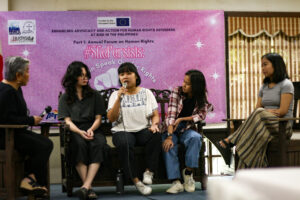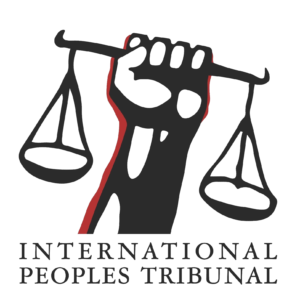Women human rights defenders Hailey Pecayo, Dyan Gumanao, Jonila Castro, and Jhed Tamano gathered as a panel for the forum titled ‘#ShePersists: Women Speak Out for Rights’ on November 27 in Quezon City.
The four women advocates recounted the attacks they faced, and explained why they persist in their advocacies. Moderated by veteran journalist Inday Espina-Varona, the forum was held ahead of the International Day for Women Human Rights Defenders.
“There’s no limit to what we can do. It’s really a challenge to women and every citizen to join the fight. Choose a side because neutrality is just going to favor the oppressor,” Tamano said.
Hailey Pecayo, the youngest on the panel, became an activist when she was only 17 years old. She is now the spokesperson of the Batangas-based human rights group Tanggol Batangan.
Pecayo faced criminal complaints filed by the 59th Infantry Battalion, which included terrorism accusations, violations of the international humanitarian law, and attempted murder. The City Prosecutor of Sta. Rosa, however, recently dropped all charges against her due to lack of evidence.
The complaints were filed following Pecayo’s participation in a fact-finding mission on the killing of Maximo Digno and Kyllene Casao in Batangas, which allegedly involved the 59th Infantry Battalion.
Pecayo’s case was not isolated. Her fellow Southern Tagalog activists Kenneth Rementilla, Jasmine Rubia, John Peter Garcia, and Rev. Glofie Baluntong are experiencing the same ordeal under the Anti-Terrorism Act.
After the dismissal of criminal complaints against Pecayo, charges against Rementilla and Rubia were also junked by the Office of the Prosecutor of Antipolo City in Rizal, citing lack of evidence.
Pecayo not only recounted her harrowing experience after being red-tagged and charged, but also highlighted the plight of fellow women human rights defenders including Alia Encela, who also suffered similar attacks.
Encela is a 19-year old indigenous peoples rights’ advocate, who was reportedly abducted in Mindoro Oriental in October. Pecayo shared that she used to work with Encela during humanitarian missions in Southern Tagalog, describing the abducted advocate as a ‘kind girl.’
She also recounted how she missed the communities in Batangas, especially the mothers.
“They are my inspiration to be back. I love what I’m doing,” she said.
‘Fake surrenderee’ scheme
Castro and Tamano, meanwhile, shared where they found the courage to speak even as they were being presented as “surrenderees” in a press conference organized by the National Task Force to End Local Communists Armed Conflict (NTF-ELCAC).
“We don’t want to lie to the public. We don’t want to be a part of the manipulation of the public,” Castro said.
“We got the courage from the fact that we have the truth,” Castro stressed.
On the night of September 2, Castro and Tamano were held captive by armed men in Orion, Bataan. Before their abduction, the two worked with the coastal communities in the province that bear the brunt of destructive reclamation projects along Manila Bay.
Seventeen days later, on September 19, they were presented by the NTF-ELCAC to the media as “rebel surrenderees.” However, in the same press conference, Castro and Tamano revealed that they were not surrenderees, but were actually abducted by the military and forced to sign a handwritten affidavit while inside a military camp saying they “voluntarily surrendered.”
“What saved Jhed and I is the mass movement,” Castro said, explaining that even if they were held incommunicado during the weeks they were held captive, they believed that people from progressive organizations are tirelessly searching for their whereabouts.
Weeks after Castro and Tamano revealed the truth behind their involuntary disappearance, the Department of National Defense filed perjury charges against the two. Despite this new wave of legal attacks, the two environmental defenders remained firm in their resolve.
Castro said that despite the attacks, both she and Tamano will continue working in the communities they are serving, especially as these communities remain in danger due to reclamation projects
“Sana samahan niyo kaming makabalik sa Bataan kasi kailangan tayo ng community doon. Hindi mga militar ‘yung dapat kasama nila ngayon, kundi tayo,” Castro appealed.
Meanwhile, Tamano described the women in the community where they work as ‘caring.’ She recalled how the community treated her and Castro like a family — taking care of them when they were sick, and teaching them how to cook.
“They also have their own experiences – the struggles they face economically and personally. They would share those stories with us. We would learn from them, and they are the source of our strength and persistence to go on,” Tamano said.
Another case of abduction that filled the headlines this year involved Dyan Gumanao, a development worker and labor rights activist from Cebu, and her partner Armand Dayoha. They were forcibly taken in broad daylight in a Cebu port last January 10. In the forum, she recounted how they were handcuffed, blindfolded, and interrogated while in captivity. It was only after five days that they were released.
When asked on who she looks up to, Gumanao said that women human rights defenders like her take inspiration and courage from their predecessors, especially survivors of Martial Law.
Gumanao also specifically mentioned a woman rights defender she had worked with in the past – slain human rights activist Zara Alvarez, who was shot dead in Bacolod City last August 2020.
“I miss Ate Zara. I miss her jokes and advice to me. I miss the time when we were together during missions. But even though the state killed her, her fighting spirit remained. She shared it not only with me but for sure, with a lot of young ones in Negros continuing the fight even as the situation in Negros intensified,” she recounted.
Karapatan Secretary General Cristina Palabay capped the forum by emphasizing how women of all ages and all walks of life showed courage in the face of adversity. From young women to veteran advocates, many people’s organizations and human rights groups now have women who continue to lead the fight against all odds.
“As they have said, they look to the past to make themselves see and others see that this movement is intergenerational,” Palabay said.
Espina-Varona also shared her thoughts, saying that in recognizing the bravery of women human rights defenders, women in the communities including the mothers and sisters who helped and worked alongside women human rights defenders should also be recognized.
“If journalists and activists are brave in this country, it is because the people they serve are brave,” Espina-Varona said.
The #ShePersists forum is part of the activities arranged by human rights organizations to mark the International Day for Women Human Rights Defenders.
“We hope that stories told by Pecayo, Gumanao, Castro, and Tamano will be retold in ways that would not only inspire but enjoin us to take action in various ways and means,” Palabay concluded.###





